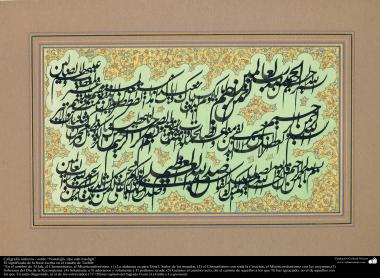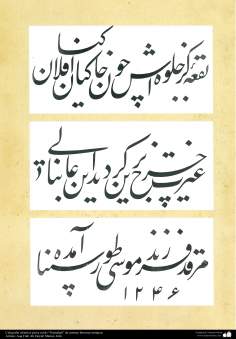-
Islamic Art
-
Arquitecture
-
Islamic Arquitecture
- Arte & Islamic Architecture in painting
- Islamic mosaics and decorative tile (Kashi Kari)
- Islamic Mogarabas (Moqarnas Kari)
- Arte con espejos incrustados (aine kari)
- City of Isfahan - Iran
- City of Mashhad - Iran
- City of Shiraz - Iran
- From other cities of Iran
- Mecca and Medina – Saudi Arabia
- City of Agra - India
- Persian Preislamic Arquitecture
-
Islamic Arquitecture
-
Persian Miniature
- Miniatures by Prof. M. Farshchian
- miniatures by Hayy Agha Emami
- Miniatures by Prof. Husein Behzad
- Miniatures by Professor M. Mehregan
- Miniatures by different artists
- Miniatures of the Book “Muraqqa-e-Golshan
- Miniatures of books of Poet Sadi, “Bustan”, “Golestan” and “Colections”
- Miniature of the books of Poet Nezami Ganjavi
- Miniatures of different books
- Miniatures of the Book “Zafar Name Teimuri”
- Miniatures of different editions of Shahname by Ferdowsi
- Miniature in Mural
- Tazhib (Ornamentation of valuables pages and texts)
-
Islamic Calligraphy
- Kufic Calligraphy – Kufic Style
- Islamic Calligraphy – “Diwani” Style
- Islamic Calligraphy – “Naskh” Style
- Islamic Calligraphy – “Nastaliq” style
- Islamic Calligraphy – “Muhaqqeq” and “Roga” Styles
- Islamic Calligraphy “Zuluz” Style
- Islamic Calligraphy – “Tawqi” style
- Calligraphy of Bismillah
- Quranic Calligraphy
- Illustrative Calligraphy
- Antique editions of the Holy Quran from early times to XIII hiyri (XIX d.C).
-
Handicrafts
- Handicrafts – traditional blocking (stamping) (Chape Qalamkar)
- Handicraft – Marquetry and Decoration of objects (Jatam Kari)
- Handicraft – Enamel (Mina Kari)
- Handicraft – Textile Art – Persian Carpets
- Persian Handicraft – Bone Painting
- Handicraft – Engraved in metal (Qalam Zani)
- Handicraft – Taracea (Marquetry)
- Weapons and decorated enamelware
- Paintings
- Islamic Pottery- Islamic ceramics
-
Arquitecture
- Muslim Woman
- Holy Places of Islam
-
Poster
- Caricature
L'art islamique fait référence à la partie de l'art qui est répandu dans la communauté musulmane et non pas nécessairement par des musulmans. La calligraphie, c’est l'écriture avec la beauté.La calligraphie a toujours été considéré comme l’art le plus haut dans tous les pays islamiques. l'Iran a de Grands maîtres dans le domaine de la calligraphie. Habibollah Fazaeli est l'un des grands maîtres.
Naskh est un ligne inventé au début du IIIe siècle par Ibn Moghleh Shirazi
A partir du cinquième siècle,le style Naskh a souvent été utilisé dans l'écriture du Coran.
Le Coran est le livre sacré de l'islam et les musulmans le croient les paroles de Dieu qui a été révélé par l'ange Gabriel au prophète de l'Islam. pour les Musulmans, le Coran est le plus grand miracle du prophète Mahomet. Coran est considéré comme la source principale de la révélation de l'islam qui est en langue arabe. Le mot Coran signifie littéralement « lire » et « lecture ». Le Coran est divisé en 30 parties et comporte 114 Sourates.












